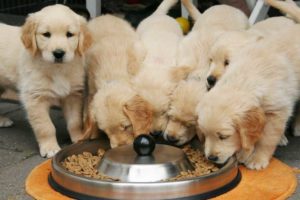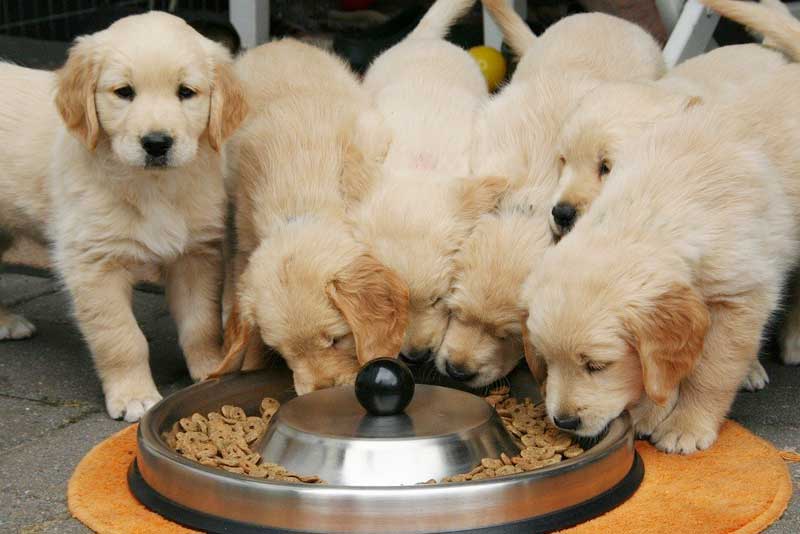
Photo by SNGPhotography on Pixabay
Puppies are adorable and energetic creatures that require special attention when it comes to their diet. As a responsible pet owner, it’s crucial to provide them with the right nutrition to ensure their growth and development. In this comprehensive guide, we will explore the best dietary practices for puppies, including recommendations for puppies with coccidia, upset stomach, and parvo.
Understanding Puppy Nutrition
Before diving into specific dietary recommendations, it’s essential to understand the basics of puppy nutrition. Puppies have unique nutritional needs due to their rapid growth and high energy levels. A well-balanced diet should consist of the right balance of protein, fats, carbohydrates, vitamins, and minerals.
The Importance of Protein
Protein plays a vital role in a puppy’s diet as it provides the building blocks for muscle development and repair. High-quality animal-based protein sources, such as chicken, beef, and fish, are essential for optimal growth. Look for puppy food formulas that list a specific animal protein source as the main ingredient.
Essential Fats for Puppies
Fat is another crucial component of a puppy’s diet. It provides energy and supports healthy skin and coat. Essential fatty acids, such as omega-3 and omega-6, are especially important for puppies’ brain development. Look for puppy food that contains healthy fats from sources like fish oil or flaxseed oil.
Carbohydrates for Energy
Carbohydrates are an important energy source for puppies. Look for puppy food formulas that include whole grains and vegetables as sources of carbohydrates. These complex carbohydrates provide sustained energy and also contribute to healthy digestion.
Vitamins and Minerals
Vitamins and minerals are essential for a puppy’s overall health and well-being. Look for puppy food that includes a wide range of vitamins and minerals to support their immune system, bone development, and overall growth.
Now that we have a basic understanding of puppy nutrition, let’s explore specific dietary recommendations for puppies with different health conditions.
Puppies with Coccidia

Coccidiosis is an intestinal infection caused by a single-celled organism called coccidia. Puppies infected with coccidia may show a range of clinical signs, including diarrhea, inappetence, and lethargy. Treatment typically involves the administration of a prescription antibiotic to eliminate the organism.
Feeding Recommendations for Puppies with Coccidia
If the puppy is asymptomatic, they can continue to eat their regular puppy diet. However, if the puppy has experienced significant digestive upset, a change in diet may be necessary. In such cases, a bland, low-fat, easily digestible diet is recommended.
One option is Purina Pro Plan Puppy Sensitive Skin & Stomach Dry Dog Food. This diet is specifically formulated for puppies with sensitive stomachs and provides the necessary nutrients while being gentle on the digestive system. If the puppy has lost weight, a more calorie-dense diet may be used in the short term. It’s important to consult with a veterinarian to determine the best diet for your puppy based on the severity of the infection and their gut’s recovery.
Puppies with Upset Stomach
Puppies can experience upset stomachs due to various reasons, including ingestion of non-food items, dietary changes, infections, or exposure to toxins. The severity of the upset stomach can range from mild to severe, and it’s important to work with a veterinarian to determine the underlying cause.
Feeding Recommendations for Puppies with Upset Stomach
In the case of simple causes of stomach upset, a bland, low-fat, easily digestible diet may help alleviate symptoms. One option is Royal Canin Veterinary Diet Gastrointestinal Puppy Dry Dog Food. This prescription diet is designed to support digestion and is offered in smaller, more frequent meals for a few days. If the puppy’s digestive issues improve, a gradual transition back to their regular puppy food can usually be made. In some cases, a probiotic may be prescribed to aid in digestion.
If food intolerance is suspected as the cause of continued stomach upset, a hypoallergenic diet like Royal Canin Veterinary Diet Hydrolyzed Protein HP Dry Dog Food or a limited ingredient diet may be recommended. These diets help identify and eliminate specific food allergens that might be causing the upset stomach.
Puppies with Parvo

Parvovirus is a highly contagious virus that affects the intestinal tract of puppies. It can lead to severe symptoms such as vomiting, diarrhea with blood, lethargy, and inappetence. Most puppies affected by parvovirus require intensive care in a hospital setting.
Feeding Recommendations for Puppies with Parvo
Proper hydration and nutrition are crucial for managing parvo and aiding in the puppy’s recovery. During a hospital stay, nutrition may be provided through a feeding tube or intravenous catheter. Some puppies may be able to tolerate small, frequent meals through syringe feeding. Once the puppy has recovered, they can transition back to a regular puppy food diet.
A prescription diet that is bland, low-fat, and easily digestible will likely be recommended for the recovery period. One option is Purina Pro Plan Veterinary Diets CN Critical Nutrition Formula Canned Dog & Cat Food, which provides a calorie-dense critical care recovery diet. It’s important to follow the veterinarian’s guidance and monitor the puppy’s progress closely during the recovery phase.
Conclusion
In conclusion, providing the right nutrition for puppies is crucial for their growth and development. Understanding their unique nutritional needs and seeking guidance from a veterinarian can help ensure they receive the appropriate diet. For puppies with coccidia, upset stomach, and parvo, specific dietary recommendations tailored to their condition can aid in their recovery. Remember to consult with a veterinarian to determine the best course of action for your puppy’s dietary needs.
For further reading on puppy nutrition and related topics, check out these resources:
- The Importance of Balanced Nutrition for Puppies
- Feeding Tips for Puppies with Sensitive Stomachs
- Understanding Parvovirus in Puppies
